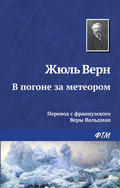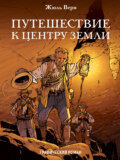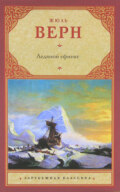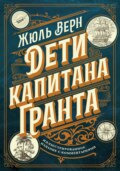
Жюль Верн
Дети капитана Гранта / The Children of Captain Grant
Chapter XIII. A Sudden Descent
The hut was covered with snow, and scarcely distinguishable from the surrounding rocks; but Wilson and Mulrady succeeded in digging it out and clearing the opening after half an hour’s hard work, to the great joy of the whole party.
Its form was that of a cube, 12 feet on each side, and it stood on a block of basalt. A stone stair led up to the door, the only opening; and narrow as this door was, the hurricane, and snow, and hail found their way in.
Ten people could easily find room in it. Besides, there was a sort of fireplace in it, with a chimney of bricks, badly enough put together.
“This will shelter us, at any rate,” said Glenarvan, “even if it is not very comfortable. Providence has led us to it, and we can only be thankful.”
“Why, it is a perfect palace, I call it,” said Paganel; “we only want flunkeys and courtiers.”
“Especially when there is a good fire blazing on the hearth, for we are quite as cold as we are hungry.”
“Well, Tom, we’ll try and get some combustible or other,” said Paganel.
“Combustibles on the top of the Cordilleras!” exclaimed Mulrady, in a dubious tone.
“Since there is a chimney in the hut,” said the Major, “we shall find something to burn in it.”
“Our friend McNabbs is right,” said Glenarvan. “I’ll go out and become a woodcutter.”
“Wilson and I will go with you,” said Paganel.
“Do you want me?” asked Robert, getting up.
“No, my brave boy, rest yourself. You’ll be a man, when others are only children at your age,” replied Glenarvan.
Glenarvan and Paganel stopped to gaze about them and scan the horizon on all sides. They were now on the summit of the Cordilleras, and could see over an area of forty miles. The valley of the Colorado was already sunk in shadow, and night was fast drawing her mantle over the eastern slopes of the Andes.
Thy would have remained there, gazing at the sublime struggle between the fires of earth and heaven, if the more practical Wilson had not reminded them of the business on hand. There was no wood to be found, however the rocks were fortunately covered with lichen. This precious combustible was carried back to the hut. It was a difficult matter to kindle it, though, and still more to keep it alight.
Paganel couldn’t help saying:
“I tell you what, some grilled llama wouldn’t be bad, would it? They say that the llama is substitute for the ox and the sheep.”
“What!” replied the Major. “You’re not content with your supper, most learned Paganel.”
“Enchanted with it, my brave Major; still I must confess I should not say no to a dish of llama.”
“Alright. We’ll go to sleep.”
Each one, thereupon, wrapped himself up in his poncho, and the fire was made up for the night.
But Glenarvan could not sleep. Secret uneasiness kept him in a continual state of wakefulness. They could not be pursued by wild beasts, for at such an elevation there were almost none to be met with. Glenarvan felt approaching danger. He got up and went out to see.
The moon was rising. The atmosphere was pure and calm. Not a cloud visible either above or below. He looked at his watch and found the time was about two in the morning. As he had no certainty, however, of any immediate danger, he did not wake his companions, who were sleeping soundly after their fatigue, and after a little slept himself heavily for some hours.
All of a sudden[61] a violent crash made him start to his feet. A deafening noise fell on his ear like the roar of artillery. He shouted to his companions, but they were already awake.
“An earthquake!” exclaimed Paganel. He was not mistaken. It was one of those cataclysms frequent in Chili.
The plateau to which the seven men were clinging, holding on by tufts of lichen, was rushing down the declivity with the swiftness of an express, at the rate of fifty miles an hour. Sometimes they went perfectly smoothly along without jolts or jerks, and sometimes on the contrary, the plateau would reel and roll like a ship in a storm.
How long this indescribable descent lasted, no one could calculate. None of the party knew whether the rest were still alive. Almost breathless, frozen with the cold air, which pierced them through, and blinded with the whirling snow, they gasped for breath, and became exhausted and nearly inanimate. Suddenly a tremendous shock sent them rolling to the very foot of the mountain. The plateau had stopped.
For some minutes no one stirred. At last one of the party stood on his feet, stunned by the shock, but still firm on his legs. This was the Major. He shook off the blinding snow and looked around him. His companions lay in a close circle like the shots from a gun.
The Major counted them. All were there except one—that one was Robert Grant.
Chapter XIV. Providentially Rescued
The eastern side of the Cordilleras of the Andes consists of a succession of lengthened declivities. The soil is carpeted with rich herbage, and adorned with magnificent trees, among which, in great numbers, were apple-trees.
Lord Glenarvan and his companions were gradually restored to life by the Major’s efforts. The descent of the Cordilleras was accomplished; but the feeblest and youngest, the child of the party, was missing.
The brave boy was beloved by everybody. Paganel was particularly attached to him, and so was the Major, with all his apparent coldness. As for Glenarvan, he was in absolute despair when he heard of his disappearance.
“We must go and look for him, and look till we find him,” he exclaimed. “We cannot leave him to his fate. Every valley and precipice and abyss must be searched through and through. I will have a rope fastened round my waist, and go down myself. I insist upon it, you understand? I insist upon it. If we lose the boy, how could we ever dare to meet the father? What right have we to save the captain at the cost of his son’s life?”
Glenarvan’s companions heard him in silence. At last he said: “Well, you hear what I say, but you make no response. Do you mean to tell me that you have no hope—not the slightest?”
Again there was silence, till McNabbs asked: “Which of you can recollect when Robert disappeared?”
No one could say.
“Well, then,” resumed the Major, “who was near the child during our descent of the Cordilleras?”
“Me,” replied Wilson. “All that I can recollect is that Robert Grant was still by my side, holding fast by lichen, less than two minutes before the shock which finished our descent.”
“Less than two minutes? Are you sure you are not making a mistake?”
“I don’t think I am. No; it was just about two minutes, as I tell you.”
“Very well, then; and was Robert on your right or left?”
“On my left. I remember that his poncho brushed past my face.”
“Then Robert must have disappeared on this side,” said the Major, turning toward the mountain and pointing toward the right.
Not another word was spoken. The six men commenced their explorations, examining closely every fissure, and going into the very depths of the abysses. For many long hours these brave fellows continued their search without dreaming of taking rest. But all in vain.
About one o’clock, Glenarvan and his companions met again in the valley. Glenarvan was completely crushed with grief. He scarcely spoke.
“Let us wait,” said Paganel to the Major and Tom Austin. “We will take a little rest, and recruit our strength. We need it anyway. Poor Robert!”
So the day passed, and night came on, calm and peaceful as the preceding had been.
Day dawned. The poor Lord’s despair was terrible. But there were strong reasons to continue the route as soon as possible.
McNabbs shook Lord Glenarvan’s head, and said, almost inaudibly: “We must start.”
“Wait longer.”
“Yes, we’ll wait,” replied the Major.
So the day passed on till it was almost noon. McNabbs hesitated now no longer, but told his cousin that they must start, for all their lives depended on prompt action.
“Yes, yes!” replied Glenarvan. “Let us start, let us start!”
But he spoke without looking at McNabbs. His gaze was fixed intently on a certain dark speck in the heavens. Suddenly he exclaimed, extending his arm:
“There! There! Look! Look!”
All eyes turned immediately in the direction indicated so imperiously. The dark speck was increasing visibly. It was evidently some bird hovering above them.
“A condor,” said Paganel.
“Yes, a condor,” replied Glenarvan. “Who knows? It is coming down—it is gradually getting lower! Let us wait.”
Paganel was not mistaken, it was a condor. This magnificent bird is the king of the Southern Andes, and was formerly worshiped by the Incas[62]. It seizes sheep, and kids, and young calves, browsing on the plains, and carries them off to inaccessible heights.
The Major and Wilson had seized their carbines, but Glenarvan stopped them by a gesture. The condor was encircling in his flight an inaccessible plateau. It wheeled round and round, opening and shutting his formidable claws.
“It is there, there!” exclaimed Glenarvan.
A sudden thought flashed across his mind, and with a terrible cry, he called out, “Fire! Fire! Oh, suppose Robert were still alive! That bird.”
Only a second passed, a second that seemed an age, and the enormous bird reappeared, carrying a heavy load and flying at a slow rate. It was a human body the condor had in his, and apparently lifeless—it was Robert Grant. The bird had seized him by his clothes, and had him hanging already at least one hundred and fifty feet in the air.
“Let me do it,” said the Major. And with a calm eye, and sure hands and motionless body, he aimed at the bird, now three hundred feet above him in the air.
But before he had pulled the trigger the report of a gun resounded from the bottom of the valley. A white smoke rose from between two masses of basalt, and the condor, shot in the head, began to fall, supported by his great wings spread out like a parachute. It had not thrown his prey, but gently sank down with it on the ground, about ten paces from the stream.
“We’ve got him, we’ve got him,” shouted Glenarvan; and he rushed toward the condor, followed by his companions.
When they reached the spot the bird was dead, and the body of Robert was quite concealed beneath his mighty wings. Glenarvan flung himself on the corpse, and dragging it from the condor’s grasp, placed it on the grass, and knelt down and put his ear to the heart.
Glenarvan uttered the next moment, as he started to his feet and exclaimed:
“He is alive! He is still alive!”
The boy’s face was bathed with cold water. He moved slightly, opened his eyes, looked round and murmured, “Oh, my Lord! Is it you!” he said; “My father!”
Glenarvan could not reply. He was speechless with emotion, and burst into tears.
Chapter XV. Thalcave
But who was the hunter? He was not far off, for about fifty paces from them, a man of very tall stature was seen standing motionless on the lowest crags at the foot of the mountain. A long gun was lying at his feet.
He had broad shoulders, and long hair. He was over six feet in height. His bronzed face was red between the eyes and mouth, and white on the forehead. He wore the costume of the Patagonians, consisting of a splendid cloak, ornamented with scarlet arabesques, made of the skins of the wild animals. Under this mantle was a garment of fox-skin, fastened round the waist. A little bag hung from his belt. This Patagonian had a splendid face, indicating real intelligence. His attitude was full of dignity; indeed.
As soon as the Major perceived him, he pointed him out to Glenarvan, who ran toward him immediately. The Patagonian came two steps forward to meet him, and Glenarvan caught hold of his hand and pressed it in his own. It was impossible to mistake the meaning of the action, for the noble face of the Scotch lord so beamed with gratitude that no words were needed. The stranger bowed slightly in return, and said a few words that neither Glenarvan nor the Major could understand.
Certain words, however, caught Glenarvan’s ear as sounding like Spanish, a few sentences of which he could speak.
“Español?[63]” he asked.
The Patagonian nodded in reply.
“That’s good!” said the Major. “Our friend Paganel will help us.”
Paganel came at once, and saluted the stranger with all the grace of a Frenchman. But the Patagonian did not understand a single syllable.
However, Paganel began in Spanish, and said: “Vos sois um homen de bem[64].”
The native listened, but made no reply.
“He doesn’t understand,” said the geographer.
“Perhaps you haven’t the right accent,” suggested the Major.
Once more Paganel repeated his compliment, but with no better success.
“I’ll change the phrase,” he said; and in slow, deliberate tones he went on: “Sem duvida um Patagão[65].”
No response still.
“Dizeime![66]” said Paganel.
But no answer came.
“Vos compriendeis?[67]” shouted Paganel, at the very top of his voice.
Evidently the Indian did not understand, for he replied in Spanish: “No comprendo[68].”
Addressing the Patagonian, Glenarvan repeated the word: “Español?”
“Sí, sí[69],” replied the Indian.
Paganel’s surprise became absolute stupefaction.
“It’s clear enough the man speaks Spanish.”
“Yes, he certainly speaks Spanish. Perhaps it is some other language you have been studying all this time instead of—”
But Paganel would not allow him to proceed. He shrugged his shoulders, and said stiffly: “You go a little too far, Major.”
“Well, how is it that you don’t understand him then?”
“Why, of course, because the man speaks badly,” replied the learned geographer, getting impatient.
“He speaks badly; that is to say, because you can’t understand him,” returned the Major coolly.
“Come, come, McNabbs,” put in Glenarvan, “your supposition is quite inadmissable. My good Paganel—explain it then.”
“I explain nothing. I give proof. Here is the book I use daily, to practice myself in the difficulties of the Spanish language. Examine it for yourself, Major,” he said, handing him a volume, from the depths of one of his numerous pockets.
“And what’s the name of this book?” asked the Major, as he took it from his hand.
“The ‘Lusiades’[70], an admirable epic, which—”
“The ‘Lusiades’!” exclaimed Glenarvan.
“Yes, my friend, the ‘Lusiades’ of the great Camoens, neither more nor less.”[71]
“Camoens!” repeated Glenarvan; “but Paganel, my unfortunate fellow, Camoens was a Portuguese! It is Portuguese you have been learning for the last six weeks!”
“Camoens! ‘Lusiades’! Portuguese!” Paganel could not say more. He looked vexed, while his companions broke out in a furious burst of laughter.
The Indian never moved a muscle of his face. He quietly awaited the explanation.
“Fool, idiot, that I am!” at last uttered Paganel. “Is it really a fact? You are not joking with me? It is what I have actually been doing? Ah me! My friends, what is to become of me? To start for India and arrive at Chili! To learn Spanish and talk Portuguese! Laugh away, my friends, laugh as loud as you like; you can’t laugh at me half as much as I laugh at myself!”
“But, I say,” said the Major, after a minute, “this doesn’t alter the fact that we have no interpreter.”
“Oh, don’t distress yourself about that,” replied Paganel, “Portuguese and Spanish are much alike. In a very short time I shall be able to thank the Patagonian in the language he speaks so well.”
Paganel was right. He soon managed to exchange a few words with the stranger, and found out even that his name was Thalcave[72], a word that signified “The Thunderer.”
But what rejoiced Glenarvan most was to learn that he was a guide by occupation, and, moreover, a guide across the Pampas.
When the party went back to Robert, the Patagonian silently laid his hand on his head, and proceeded to examine him with the greatest care, gently feeling each of his aching limbs. Then he gathered a few handfuls of wild celery, which grew on the banks, with which he rubbed the child’s body all over. He handled him with the most exquisite delicacy, and his treatment revived the lad’s strength.
Happily, Thalcave was a practiced guide, and one of the most intelligent of his class. He undertook to find all that was needed, and offered to take them to Indians, where he could get supplies. This proposition was partly made by gestures, and partly by a few Spanish words which Paganel managed to understand. His offer was accepted, and Glenarvan and his learned friend started off with him at once.
Thalcave did the bargaining. It did not take long. In exchange for seven ready saddled horses, 100 pounds of dried meat, several measures of rice, and leather bottles for water, the Indians agreed to take twenty ounces of gold.







